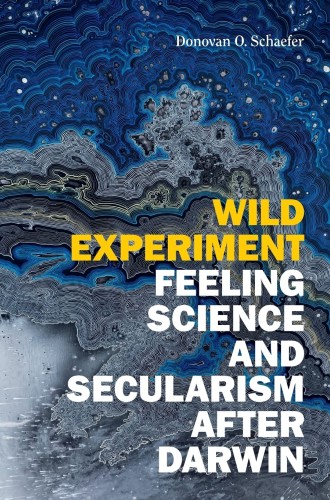How secularism feels
Donovan Schaefer sets out to correct the misrepresentation of secularity as the realm of pure reason.
In Donovan Schaefer’s earlier book, Religious Affects, the religion theorist considered the role of emotion in shaping self-understanding and belief. Because that book focused on religion, he worried that he left the impression that religious people’s beliefs are uniquely shaped by emotion in a way that nonreligious people’s beliefs are not. In this book, which focuses on secularism as a regime of feeling, Schaefer sets out to correct that potential misinterpretation.
This kind of correction is necessary because of two problematic assumptions often inherent in discourse about religion and secularity, both hangovers from the Enlightenment. One is that religion is the realm of the irrational, while nonreligious people base their understandings of the world on reason. The other is that thinking and feeling are two separate functions of the human brain.
Read our latest issue or browse back issues.
Wild Experiment breaks down these binaries. All thinking, says Schaefer, is also feeling. Feeling thinks and thinking feels. And secularism is based every bit as much on the interplay between thinking and feeling as religion is. Certain explanations of the world come to feel right for reasons rooted in our emotional and physical lives. Once we understand that, we are then ready to reevaluate the tradition of secularism, from Darwin to the New Atheists. Schaefer sets out to do this by looking at a range of conflicts between religion and the secular throughout modernity.
Schaefer is interested in a feeling that he calls “click.” It’s the sense you have that what you’re thinking is true or right. Click is a powerful example of the simultaneity of thinking and feeling. This happens even in scientific reasoning. Scientists rely not only on the scientific method and the accumulation of data but also on an internal resonance, an emotional response to their labors, that tells them if they are on the right track. It’s not spoken about as often as experimentation itself, but it provides an important piece of feedback in any scientific work. Schaefer uses examples from eminent scientists to make his point. Barbara McClintock, whose work on genetics transformed the field, often described having a “feeling” for the corn that she spent hours observing. She felt her way into knowledge of genetics, translating those feelings back into groundbreaking science. Schaefer argues that she used the experience of click to know how to proceed.
But click is not only a scientific or a religious feeling. It is also inherent in conspiracy theories, racialized reason, and other deleterious forms of knowledge production. Schaefer treats conspiracy theories and racialized reason somewhat differently.
Conspiracy theory occurs when a person or a group gets overly obsessed with click. In a conspiracy theory, everything clicks. “Conspiracy theory creates what we might call a simplex system—an artificial flattening of the complexity of the world in order to make it more enjoyable. Click fascination leads to an endless pursuit of interesting ideas with no checks and balances—a corrupt, broken-mirror version of the sense of science.” Once a person has been convinced that there is truth in a conspiracy theory, it becomes extremely hard to dislodge that feeling of truth and the pleasure involved in finding it. Even though conspiracy theory is obsessed with evidence, it “doesn’t try to explain. It aims to electrify the world with significance.” The paranoid mind, as many have explained, is far more coherent than the real world and produces far more cogency, so it is rich in click.
Racialized reason is another way that something untrue feels true. Racism isn’t just a mistaken proposition (e.g., some kinds of humans are better than other kinds of humans). If only this were so. Instead, racialized reason is a “whole topography” of thinking that is in direct contact with the emotional machinery of scientific knowledge production. Thus it frequently throws scientific knowledge production off course. As with conspiracy theories, once it has taken hold, racialized reason is very hard to dislodge.
Racialized reason is based on a dynamic of abjection and desire: creating “others” who are less than and then desiring them. It can also quickly withdraw from the public arena and wear a mask of indifference. We saw this dynamic frequently during the political campaigns of both Sarah Palin and Donald Trump, where demonization and objectification of various others were often on display but would then disappear into thinly veiled denial. Racialized reason can, of course, overlap with conspiracy theory in propositions like “Barack Obama is a Muslim.” It feels so good within the discourse of its type of reason that it must be true. No amount of evidence can make it untrue. A claim like that has a strange power to shift the realm of cultural feeling even when it is cognitively rejected.
Schaefer’s ultimate goal is to carry this kind of analysis into secularism studies, to interrogate how secularism feels and what ways there are of being secular. He explores this by looking at things like Darwin’s secularity in his religious context, the Scopes trial of the 1920s, and the New Atheist movement of the early 21st century. Secularism, in various forms, is a way of life: a set of habits, culture, association, disciplines, and dispositions. It’s a regime of feeling that doesn’t eradicate religious feeling but rather replaces it with something else.
Schaefer ends Wild Experiment with the question of why we are so unable to act on climate change. To many people, and perhaps especially those with the power to make a difference, climate change doesn’t feel real. Those who have the evidence that climate change is real don’t have a sense of how to make that evidence feel real to others. New information won’t help us until we can shape how it is received.
But still, he argues, facts are powerful. The feeling of click is persuasive. The book ends on an apocalyptic note. Climate change denial and the resulting climate change will, he says, be “a long, exhausting endgame. It will mean mayhem, violence, and starvation for every human alive and for our animal kin.” What a good, truth-confirming click could do for us in that case isn’t clear. But meanwhile, perhaps humanities scholars such as Schaefer can be useful in the climate crisis. They can help scientists pay attention to how knowledge feels—and thus how to be more effective in communicating it.







